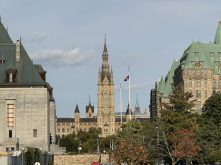A Senate committee is studying legislation that would make supply management off limits in future trade negotiations
REGINA — Canadian agricultural exporters mounted a full court press against Bill C-282 last week, while the Senate committee studying the bill heard former ambassadors and federal ministers say it’s bad policy.
The bill to protect supply management in future trade negotiations appears to have support from several members of the committee on foreign affairs and international trade, but many witnesses told them it isn’t necessary and could be harmful.
The committee has now completed its hearings and was to begin clause-by-clause consideration Nov. 6.
Read Also

Huge Black Sea flax crop to provide stiff competition
Russia and Kazakhstan harvested huge flax crops and will be providing stiff competition in China and the EU.
More than 40 agricultural organizations signed a letter via the Canadian Agri-Food Trade Alliance outlining the dangers the bill, if passed, poses to the United States-Mexico-Canada Agreement.
Both presidential candidates have said they consider the 2026 review to be a renegotiation.
The letter said Canada relies on USMCA to drive integrated economies and supply chains and to provide the framework for one of the most important trading relationships.
It said key provisions could be at risk if Canada’s negotiators are handcuffed.
These include the dispute settlement chapter, rules of origin provisions, labour standards, environmental commitments and more.
Former Liberal cabinet minister John Manley, who held several high-profile portfolios in the Jean Chretien government, spoke strongly against the bill.
“I think this bill is meant as a political statement, but it’s tactically wrong and I think that it’s strategically wrong,” he told the committee.
John Treleaven, a former trade negotiator and ambassador to the Philippines, said he came from a strong background in the supply managed sector but couldn’t support Bill C-282.
He listed other ambassadors and negotiators the committee had heard from.
“Each has expressed deep reservations about the risks to our trading position future success should this bill pass in the present form. I endorse their views in the strongest possible terms,” Treleaven said.
Manley said the bill would exacerbate internal trade tension between regions that are heavily dependent on supply management and those that aren’t.
Marc Gold, government representative in the Senate, noted the bill received broad support from all parties in the House of Commons and asked Manley how the Senate should take that into account.
Manley said the bill received almost no attention before the Commons vote. He said the supply managed sector doesn’t contribute massive amounts to the gross domestic product or engage a lot of people.
“The reality is this is the most effective lobby group in Canada. This is Canada’s (National Rifle Association), and at some point we’re just going to have to confront that,” he said.
Manley said political parties are careful about which issues they “poke” pre-election.
He said the Liberal government elected in 1993 faced a financial catastrophe and had to cut a lot of federal spending.
“One of the things we did was reform the Crow rate in Western Canada, and looking at the supply management system in the immediate face of a potential Quebec referendum, which in fact occurred in 1995, it was judged politically inexpedient to consider reforming that system at that point in time, although it had been under heavy attack in our trade negotiations,” he said.
“There’s never going to be a politically perfect time.”
The bill has drawn increasing attention since the Bloc Quebecois named it as one of two pieces of legislation it wanted passed by Oct. 29 in order to prevent an early election.
Supply managed sectors and the National Farmers Union have spoken in favour of the bill, as has former Nova Scotia MP and parliamentary secretary to the agriculture minister, Mark Eyking.
He said all countries have sensitive products they want to protect, yet they frequently go after Canadian dairy. They also use non-tariff trade barriers.
He said Canada should be able to export and protect its supply managed industries.
“I think we can do both. We have done both before, but we have to go in there as a unified voice and explain that both systems can exist,” Eyking said.


















